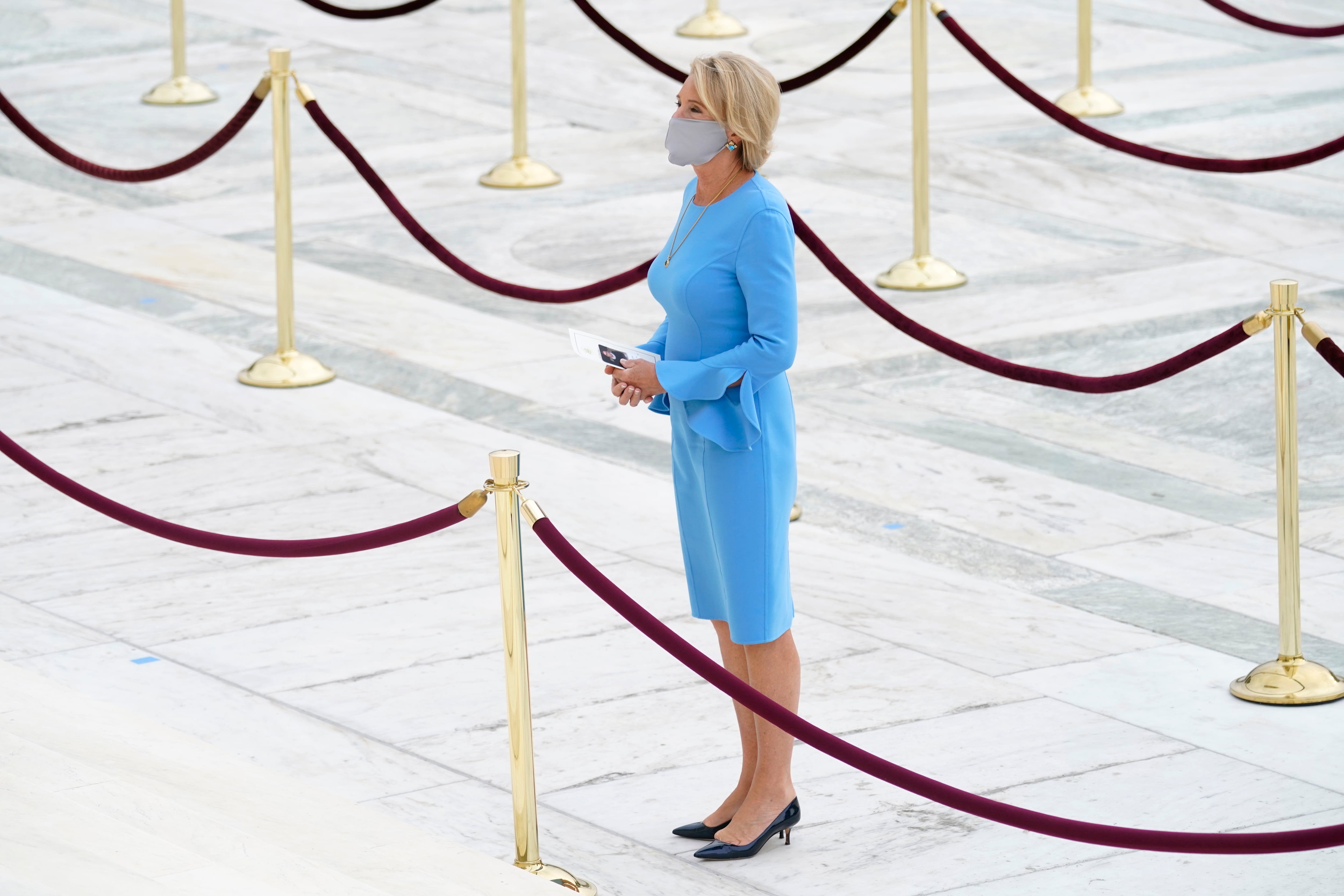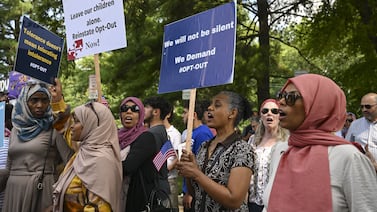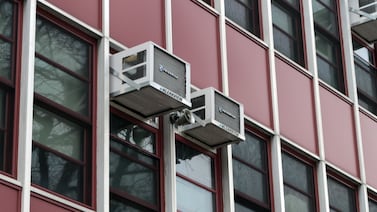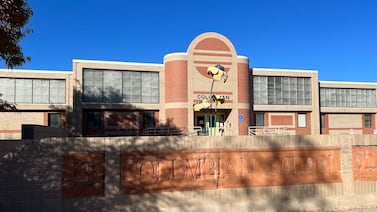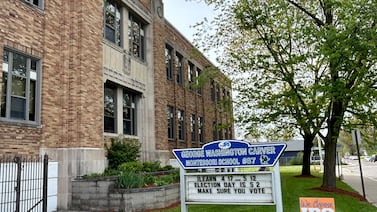Betsy DeVos’ controversial effort to route more coronavirus aid to private schools ended Friday.
The U.S. Department of Education told state school chiefs that it will not appeal a decision by a federal judge that blocked its rule, dealing DeVos one of the most high-profile losses of her tenure as education secretary.
“The Department strongly, but respectfully, disagrees with the ruling. However, we respect the rule of law and will enforce the law as the courts have opined,” DeVos wrote in a letter to state officials.
DeVos’ decision not to appeal likely reflects the rule’s shaky legal standing. The department’s defense was decisively rejected by three federal judges, including one appointed by President Trump, and the rule had little political support in Congress.
The court fights have kept schools from being able to access the full pot of federal relief money. Now, it’s clear how more than $13 billion in CARES education dollars will be divvied up between public and private schools.
“We’re recognizing that students may be being hurt if we were to continue,” Jim Blew, a top deputy at the Department of Education, said at an education research conference earlier this month.
DeVos’ ultimately quixotic campaign reflects her interest in supporting alternatives to public schools even during a pandemic and in the face of significant legal and political obstacles. She acknowledged during a radio interview in May that she was “absolutely” using the crisis to advance her agenda.
The saga began this March when Congress passed the CARES Act, which said some education relief money should be used to support private schools through a practice known as “equitable services.”
The idea isn’t new: School districts set aside money they get through Title I in the federal education law this way for services like tutoring or after school programming at local private schools. In fact, the CARES Act says the private school set-aside should be done in the “same manner” as Title I.
That’s why DeVos’ move in late April caught many off guard. Her department instructed districts to allocate money in a different way — based on the share of all students in the area who attend private schools, not just their share of low-income students.
Since private schools tend to serve a smaller share of poor students than public schools, they would have gotten more aid under DeVos’ approach. Nationally, about 5% of low-income students attend private schools; 10% of all U.S. students do.
Louisiana estimated that DeVos’ rule meant its districts would have to set aside $31.5 million rather than $8.6 million for private schools, out of the $227 million for schools it received from the CARES Act. Denver Public Schools, part of one of the lawsuits, estimated that it would have had to allocate $1.8 million rather than $340,000.
“While it wasn’t the majority of the funding, I’m in a situation in my district where we made $65 million in cuts this year,” said Susana Cordova, Denver’s superintendent. “We are working on saving not just every dollar, but every penny.”
Many public school groups criticized the move as inequitable, effectively moving dollars away from low-income students in public schools just as those schools faced a mountain of new costs and state budget cuts.
“What I would hope is that the federal government would be seeking ways to make the critically important work of educating the students easier and not harder,” Cordova said last week.
The diversion particularly irked public school advocates because private schools — unlike public schools — had access to billions in forgivable loans through the Paycheck Protection Program, another part of the CARES Act. In April, soon after DeVos released the guidance, the American Federation of Teachers and the national school superintendents association even called on local school officials to disregard the guidance, which was not legally binding.
Some states said they would follow the guidance. Others said they would not.
Meanwhile, DeVos found limited political and legal support. Congressional Democrats quickly criticized the move. More surprisingly, Tennessee Senator Lamar Alexander, the Republican chair of the Senate education committee, said he didn’t agree with DeVos’ interpretation either. The nonpartisan Congressional Research Service, as well as a number of legal scholars, said DeVos’ approach clashed with a straightforward reading of the law.
DeVos fired back, saying private schools were under financial strain too, and attempting to recast the debate as one about protecting the rights of all students.
“There is nothing in the Act suggesting Congress intended to discriminate between children based on public or non-public school attendance, as you seem to do,” she wrote in May to the organization representing state education officials. “The virus affects everyone.” (Notably, even critics of her rule agreed private schools were entitled to some aid; the dispute turned on how much.)
If districts disagreed with her approach, they should set aside the disputed money and wait, DeVos said. But that created its own problems.
“If districts are holding a substantial amount of the funds that they received from the CARES Act in escrow, then that money is not available in real time to address what are in some cases urgent, time-sensitive needs,” Marty West, a Harvard education a professor and a member of the Massachusetts state board of education, said prior to the department’s Friday announcement.
In June, DeVos turned the department’s guidance into a legally binding rule. She did make one major concession: the rule allowed districts to calculate private schools’ share based only on their low-income students — but only if districts agreed to restrict the use of their own CARES dollars to schools with high concentrations of low-income students.
Critics of DeVos were not mollified, however. They contended that the new approach had no basis in the text of the law and was practically unworkable. At the time, DeVos’ deputy Blew predicted that lawsuits would follow. “This story doesn’t end with today’s announcement,“ he said in June.
He was right.
Four federal lawsuits were soon filed against DeVos and her department — by states, districts, parents, and civil rights groups, including the NAACP. Meanwhile, some advocates of private schools and school choice filed briefs supporting DeVos.
Judges ruled in three of the cases, each saying that DeVos’ rule disregarded the clear language in the CARES Act.
DeVos rule was created “under the guise of a manufactured ambiguity,” wrote U.S. District Judge Barbara Rothstein in a preliminary injunction last month.
“An executive agency like the Department has no authority to rewrite Congress’s plain and unambiguous commands under the guise of interpretation,” wrote James Donato, a judge for the Northern District of California in another preliminary injunction
“In the end, it is difficult to imagine how Congress could have been clearer,” concluded Judge Dabney Friedrich, who was appointed by President Trump. This most recent ruling was a final one and applied to the country as a whole.
That left DeVos to decide whether to appeal. On Friday, she said she would not. In her letter, though, she warned that school districts must still provide some services to private schools.
“We will use our enforcement authority aggressively to ensure districts comply with this and other relevant equitable services requirements,” she wrote. “Many private schools serve disadvantaged, lower income families, and it is bad for these communities when those private schools close.”

